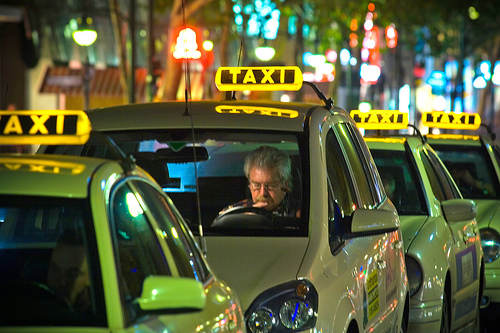The Berlin Senate is trying to kick Uber out, reports the BBC. The city’s department of civil and regulatory affairs announced a ban on the car-sharing app in a statement last Wednesday, citing safety concerns for passengers traveling in unlicensed cars driven by drivers without licenses, as well as protection for the taxi business. “The decision from the Berlin authorities is not progressive and it’s seeking to limit consumer choice for all the wrong reasons,” Fabien Nestmann, Uber’s general manager for Germany, told the New York Times. “As a new entrant we’re bringing much-needed competition to a market that hasn’t changed in years.”

Protests in Europe against sharing economy staples Uber have now moved from France and Belgium to Germany. Image from Till Krech.
Yet earlier this week, the company overcame the ban — at least temporarily — when a local court suspended it. Uber can continue to operate in Berlin until the court delivers a final decision, which, reports the Times, may take longer than a month. “This is good news for the great people of Berlin,” blogged Nestmann after the ban was suspended. “Today’s news supports freedom of choice and progress as Uber seeks to bring better, safer and cheaper transport options to everyone.”
Potential fines, however, are not so cheap. If the court were to uphold the ban, Uber could log $34,000 in fines each time an Uber driver picks up a passenger. Still, Uber, which first came to the city in February of 2013, has continued to run in Berlin despite the court’s rulings. Earlier this year, a local court order that had banned Uber was overturned, and a similar ban in Hamburg was also overturned.
Berlin’s taxi associations claim that Uber doesn’t follow the same regulations as other taxi companies contend with; plus, the city’s taxi drivers say that Uber’s drivers are able to charge less because they use GPS-powered phones that allow them to find passengers more efficiently.“What Uber is doing is really bad,” Richard Leipold, the chairman of the Berlin Taxi Association, told the Times. “I know justice can be slow. But when it works, it will come down hard.”
Uber has angered taxi drivers throughout Europe before. Earlier this summer, more than 10,000 European taxi drivers protested the company; Belgium banned the Uber service uberPOP. During a protest in London, taxi driver Mario Dalmedo explained to the Times, “There’s room for everyone, but you have to obey the law… Uber isn’t properly regulated. It’s a slippery slope. Quality of life will go down if these services are allowed to operate.”
Uber allows app users to hail taxis, rideshares, and/or private cars via a smartphone app that locates passengers (and drivers) via GPS. Payment is handled via the app, and Uber’s freelance drivers do not necessarily have to comply with the regulations that traditional taxi drivers must meet. The company is located in more than 100 cities throughout 36 countries.